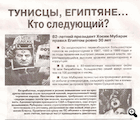 Almaty residents have found some unusual post in their mailboxes this week. Among the usual stack of adverts for supermarkets and pizza delivery lies a mysterious political tract on the tumultuous events in the Middle East entitled: "The Tunisians, the Egyptians...Who's Next?"
Almaty residents have found some unusual post in their mailboxes this week. Among the usual stack of adverts for supermarkets and pizza delivery lies a mysterious political tract on the tumultuous events in the Middle East entitled: "The Tunisians, the Egyptians...Who's Next?"
"The dictators of Egypt and Tunisia were not saved by the parliaments in their pockets or their tame parties," the leaflet warns, over a picture of a Middle Eastern demonstrator waving a placard reading "Game Over."
"Not even amendments to the law allowing these 'leaders of the nation' to put themselves forward for elections a limitless number of times helped. Today the exiled leaders of banned opposition movements are returning to these countries, and the world is observing the sun setting on the dictatorships of the 'leaders of the nation'..."
The message is hardly subtle: Kazakhstan's president, Nursultan Nazarbayev, goes by the official title of Leader of the Nation and (under a special constitutional provision) can stand for president an unlimited number of times, unlike any other citizen.
The leaflet lists a few familiar characteristics of the regimes overthrown in the Middle East: long, limitless rule; falsified elections; suppression of dissent; tame parliaments and parties; corruption involving energy proceeds; policies that enrich the ruling classes; inflation that hits ordinary people.
All these factors have uncomfortable parallels with Kazakhstan – but there are also dissimilarities. Public content with Nazarbayev's rule (consistently revealed in reliable opinion polls) is one, and it can't be disregarded -- even if it's largely fuelled by a loyal media and political apathy.
Nevertheless, the authors of the tract believe there's a lesson to be learned. "We don't live in Tunisia or Egypt. We live in Kazakhstan and are thinking how to survive another rise in prices!" the leaflet concludes dramatically. "What will our future be like? Draw parallels and answer this question independently for yourself!"
It may get people thinking, but they may also wish to ponder another question: Who wrote this anonymous tract? It doesn't bear the hallmark of the mainstream opposition, which usually puts its name to its messages. It could be one of Kazakhstan's activist movements, which rely on satire to undermine the regime, but the leaflet lacks their characteristic irony.
What about the self-styled "exiled leaders"? Kazakhstan has quite a few disgruntled citizens scattered about Europe plotting revenge on Nazarbayev who might put themselves in that category, from former PM Akezhan Kazhegeldin and one-time leader of the Democratic Choice of Kazakhstan reform movement Mukhtar Ablyazov, who lives in London, to the president's former son-in-law Rakhat Aliyev in Vienna. These figures (all facing accusations of corruption that they deny in Kazakhstan – and, in Aliyev's case, charges of coup plotting and kidnapping, too) position themselves in political opposition to Nazarbayev. They normally put their names to statements, but sympathizers could have seized the moment to draw parallels.
So who penned the tract? Watch the mailbox for further installments offering more clues.
www.eurasianet.org




